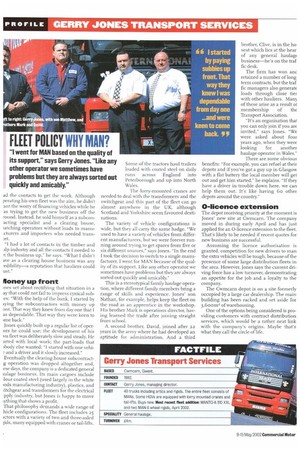FLEET POLICY WHY MAN?
Page 64

If you've noticed an error in this article please click here to report it so we can fix it.
"I went for MAN based on the quality of its support," says Gerry Jones. "Like any other operator we sometimes have problems but they are always sorted out quickly and amicably."
ad the contacts to get the work. Although perating his own fleet was the aim, he didn't ant the worry of financing vehicles while he as trying to get the new business off the round. Instead, he sold himself as a subconacting specialist and a clearing house, latching operators without loads to manu,cturers and importers who needed transart.
"I had a lot of contacts in the timber and alp industry and all the contacts I needed to rt the business up," he says. "What I didn't ave as a clearing house business was any :edibility—a reputation that hauliers could List.'
Money up front
,nes set about rectifying that situation in a ay that could not fail to impress cynical subes: "With the help of the bank, I started by tying the subcontractors with money up ont. That way they knew from day one that as dependable. That way they were keen to one back."
tones quickly built up a regular list of operors he could use; the development of his vn fleet was deliberately slow and steady. He arted with local work; the part-loads that )body else wanted: "I started with one vehi2. and a driver and it slowly increased." Eventually the clearing house subcontractg operation was dropped altogether and, ese days, the company is a dedicated general rulage business. Its main cargoes include lour coated steel (used largely in the white lods manufacturing industry), plastics, and fitchgear and transformers for the electrical .pply industry, but Jones is happy to move iything that shows a profit.
That philosophy demands a wide range of hide configurations. The fleet includes 25 rctors with a variety of two and three-axled ;ids, many equipped with cranes or tail-lifts Some of the tractors haul trailers loaded with coated steel on daily runs across England into Peterborough and up into North Wales.
The lorry-mounted cranes are needed to deal with the transformers and the switchgear and this part of the fleet can go almost anywhere in the UK, although Scotland and Yorkshire seem favoured destinations.
The variety of vehicle configurations is wide, but they all carry the same badge. "We used to have a variety of vehicles from different manufacturers, but we were forever running around trying to get spares from five or six different sources," says Jones, "In the end I took the decision to switch to a single manufacturer. I went for MAN because of the quality of its support. Like any other operator we sometimes have problems but they are always sorted out quickly and amicably."
This is a stereotypical family haulage operation, where different family members bring a range of skills and experience. Jones' son Nathan, for example, helps keep the fleet on the road as an apprentice in the workshop. His brother Mark is operations director, having learned the trade after joining straight from school.
A second brother, David, joined after 22 years in the army where he had developed an aptitude for administration. And a third
brother, Clive, is in the ho seat which lies at the hear of any general haulage business—he's on the traf fic desk.
The firm has won anc retained a number of long term contracts, but the traf fic managers also generate loads through close tier with other hauliers. Man) of these arise as a result ol membership of the Transport Association.
"It's an organisation thal you can only join if you are invited," says Jones. "We were asked about four years ago, when they were looking for another haulage operator in Wales."
There are some obvious benefits: "For example, you can refuel at their depots and if you've got a guy up in Glasgow with a flat battery the local member will gel out and get him started," he explains. "If they have a driver in trouble down here, we can help them out. It's like having 6o other depots around the country."
0-licence extension
The depot receiving priority at the moment is Jones' new site at Cwmcarn. The company moved in during early April and has just applied for an 0-licence extension to the fleet. That's likely to be needed if recent quotes for new business are successful.
Assuming the licence authorisation is granted, competition for new drivers to man the extra vehicles will be tough, because of the presence of some large distribution fleets in the area. However, Jones says the current driving force has a low turnover, demonstrating an appetite for the job and a loyalty to the company.
The Cwmcarn depot is on a site formerly occupied by a large car dealership. The main building has been racked and set aside for 3, Goom2 of warehousing.
One of the options being considered is providing customers with contract distribution services, which would be a rather neat link with the company's origins. Maybe that's what they call the circle of life.












































































































































































